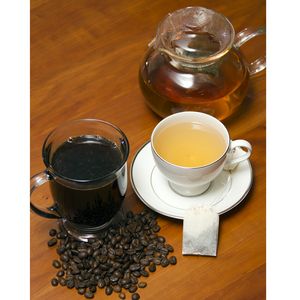
Research Highlights:
- Stroke survivors who drank seven or more cups of green tea each day lowered their risks of multiple causes of death by 62%.
- Drinking one cup of coffee each day lowered the risks of death for heart attack survivors and for those without a history of stroke or heart attack.
Embargoed until 4 a.m. CT/5 a.m. ET Thursday, Feb. 4, 2021
DALLAS, Feb. 4, 2021 — Stroke and heart attack survivors can reduce multiple causes of death and prevent further cardiovascular events by drinking green tea, according to new research published today in Stroke, a journal of the American Stroke Association, a division of the American Heart Association. The study also found daily coffee consumption helps heart attack survivors by lowering their risk of death after a heart attack and can prevent heart attacks or strokes in healthy individuals.
Previous research has examined the benefits of green tea and coffee on heart health in people without a history of cardiovascular disease or cancer. Researchers in the study “Green tea and coffee consumption and all-cause mortality among persons with and without stroke or myocardial infarction” sought to determine the effects of green tea and coffee consumption after surviving a stroke or heart attack.
“There is a strong need for scientific evidence on the lifestyles among survivors of stroke and heart attack considering the rapidly aging population and the need to improve life expectancy following these cardiovascular events,” says Hiroyasu Iso, M.D., a professor of public health at Osaka University in Suita, Japan, and the study’s corresponding author.
Researchers analyzed data of more than 46,000 participants (ages 40 to 79, 60% female) from the Japan Collaborative Cohort Study for Evaluation of Cancer Risk (JACC study), a study conducted in 45 communities across Japan. Participants were asked to complete self-administered questionnaires that included information about demographics, lifestyle, medical history and diet. People were then divided into three groups: history of stroke; history of myocardial infarction (MI); and no history of stroke or MI. Researchers then analyzed the amount and frequency of green tea and coffee consumption. Researchers noted that a typical cup of green tea contains approximately 100mL (about 3.4 ounces) of liquid, and a typical cup of coffee contains approximately 150mL (about 5 ounces) of liquid.
Results include:
- When compared with participants who rarely drank green tea, stroke survivors who consumed at least seven cups of green tea daily lowered their risk of all-cause mortality by approximately 62%. Researchers did not observe a statistically significant association among participants without a history of stroke or heart attack.
- Heart attack survivors who drank one cup of coffee a day reduced their overall risk of death by approximately 22% when compared to those who did not regularly drink coffee.
- People without a history of stroke or heart attack who consumed one or more cups of coffee a week had approximately a 14% lower risk of all-cause mortality compared to non-coffee drinkers.
- Green tea consumption can prevent further cardiovascular events in survivors, while drinking coffee can prevent such events in healthy individuals.
“An important distinction to make is that in Japanese culture, green tea is generally prepared with water and without sugar. Additionally, coffee is prepared with water and occasionally milk and sugar,” said Iso. “The healthiest way to prepare these beverages is without an unnecessary amount of added sugars.”
Researchers note that this study was observational, and the reason why drinking green tea and coffee lowered the risk of heart attack and stroke cannot be determined. Further research is needed to understand the details in the different effects of green tea and coffee.
Co-authors are Masayui Teramoto, M.D.; Iso Muraki, M.D, Ph.D.; Kazumasa Yamagishi, M.D., Ph.D.; Akiko Tamakoshi, M.D., Ph.D.
Additional Resources:
Statements and conclusions of studies published in the American Heart Association’s scientific journals are solely those of the study authors and do not necessarily reflect the Association’s policy or position. The Association makes no representation or guarantee as to their accuracy or reliability. The Association receives funding primarily from individuals; foundations and corporations (including pharmaceutical, device manufacturers and other companies) also make donations and fund specific Association programs and events. The Association has strict policies to prevent these relationships from influencing the science content. Revenues from pharmaceutical and biotech companies, device manufacturers and health insurance providers are available here, and the Association’s overall financial information is available here.
About the American Stroke Association
The American Stroke Association is a relentless force for a world with fewer strokes and longer, healthier lives. We team with millions of volunteers and donors to ensure equitable health and stroke care in all communities. We work to prevent, treat and beat stroke by funding innovative research, fighting for the public’s health, and providing lifesaving resources. The Dallas-based association was created in 1998 as a division of the American Heart Association. To learn more or to get involved, call 1-888-4STROKE or visit stroke.org. Follow us on Facebook and Twitter.
###
For Media Inquiries and AHA/ASA Expert Perspective: 214-706-1173
William Westmoreland: 214-706-1232, william.westmoreland@heart.org
For Public Inquiries: 1-800-AHA-USA1 (242-8721)
heart.org and stroke.org






Leave a Reply